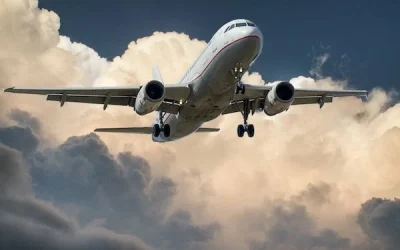Afema Ronnie Pilot & Aviation Journalist

The efficiency of the airplanes we fly today is thought to be 70% higher than it was ten years ago. By 2020, the efficiency of the present fleet was raised by 25%. The critical areas for improvement to reduce reliance on fossil fuels are aerodynamics, engine design, and weight reduction. (Capoccitti et al., 2010).
Also, read STEP-BY-STEP GUIDE TO DISPATCH A FLIGHT IN NIGERIA
The depletion of stratospheric ozone, which increases surface UV radiation, climate change, regional pollution, and local pollution are the primary environmental issues connected to aviation, according to RCEP (2002). Aircraft engines release particles, the bulk of which are sulfate from Sulphur oxides and soot, as well as carbon dioxide, nitrogen oxides, sulfur oxides, water vapor, and hydrocarbons while in flight. In numerous ways, both directly and indirectly, these emissions change the atmosphere’s chemical makeup
Also, read Business Model, Regulations, and Airline Management in Nigeria
Zero-emission aircraft are still several years away. The technologies enabling such are still in the research and development stages. The aviation sector is looking into fuel cells, solar electricity, and second-generation biofuels. With advancements in fuel technology and support from Airbus and Boeing, the aviation sector has made significant progress.
Also, read Airlines Ticket Price Elasticity of Demand and Profitability
How to Mitigate Environmental Impacts
while we wait for more effective ways to lessen emissions’ negative effects on the environment, we must adopt alternate strategies that will involve all participants in the industry. Apart from the $1 campaign, Carbon Offsetting and Reduction Scheme for International Aviation, or CORSIA has developed some alternative strategies that can help the sector to contribute its quota in reducing the impact of greenhouse gasses:
- Utilize more effective aircraft.
- Utilize modern technology to plan more direct flight paths and minimize delays.
- Invest in sustainable, low-carbon alternative fuels.
- Invest in emissions reductions both inside and outside the aviation industry.
- Regulations that are efficient and will support the $1 campaign
- Sensitization of all employees to the impacts of climate change on the environment
- Tree planting exercise
Conclusion
It is imperative to talk about how future climate change will affect air travel. The aviation industry is rife with discussion of aircraft emissions. In climate change agreements, airlines are urged to include their aviation emissions. As a result, all initiatives to reduce the industry’s negative environmental effects ought to be supported at all levels of operation.
References
Capoccitti, S., Khare, A., & Mildenberger, U. (2010). Aviation Industry – Mitigating Climate Change Impacts through Technology and Policy. Journal of Technology Management & Innovation, 5(2). Scielo. https://doi.org/10.4067/s0718-27242010000200006
Environmental defense fund. (2016). Reducing aviation’s climate impact. Environmental Defense Fund. https://www.edf.org/climate/aviation.
Also, read 7 STEPS TO GET AN AIR OPERATOR CERTIFICATE IN NIGERIA
MY KNOWLEDGE OF CHEMISTRY HELPS ME UNDERSTAND FLIGHT OPERATIONS
Goals of a Successful Integrated Marketing Communications Campaign for Airlines






0 Comments